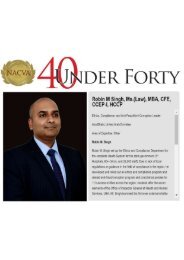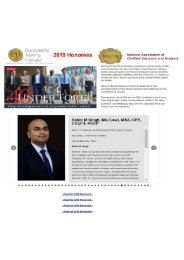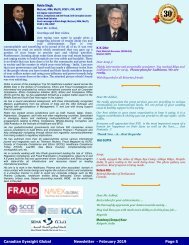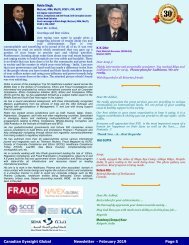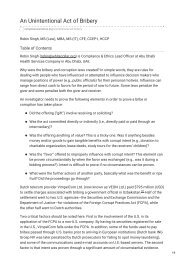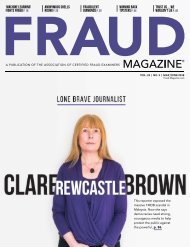Effective Whistle-blowing Hotlines by Robin Singh
Hotline pitfalls and solutions from the implementation stage to the commencement of an investigation. By #RobinSingh
Hotline pitfalls and solutions from the implementation stage to the commencement of an investigation. By #RobinSingh
You also want an ePaper? Increase the reach of your titles
YUMPU automatically turns print PDFs into web optimized ePapers that Google loves.
JUNE 2016<br />
WWW.INTERNALAUDITOR.ME<br />
Tips for Developing & Operating<br />
<strong>Whistle</strong>-<strong>blowing</strong> <strong>Hotlines</strong><br />
Fraud Trends in the Arab World<br />
INTERNAL AUDITOR<br />
MIDDLE EAST<br />
Actively Combating Procurement<br />
Fraud in Construction Projects<br />
Fraud Detection<br />
and Data Analytics<br />
Bolstering Anti-Fraud Programs <strong>by</strong> <strong>Effective</strong>ly<br />
Identifying Anomalies & Red Flags<br />
Insights on Governance, Risk Management and Control
From The President<br />
Fraud Special Issue<br />
Thanks to the efforts of the UAE Internal Auditors Association’s (UAE-IAA) Fraud<br />
Subgroup, we have launched a Special Issue on Fraud. The articles in this Special Issue<br />
only cover Fraud and related topics.<br />
Fraud has always fascinated people: how it is committed, how it gets discovered and<br />
what led the perpetrators to carry out these immoral actions in the first place. While<br />
internal auditors are not specialised fraud examiners, our stakeholders expect us to<br />
detect red flags and recommend prevention measures. This means that a majority of<br />
internal auditors are involved in responding to fraud risk, albeit in differing ways and<br />
with differing roles (For example, investigations, facilitating fraud risk assessments,<br />
fraud awareness training, etc). In this Special Issue you will learn about a variety of<br />
fraud related topics which include using data analytics to detect fraud, whistle <strong>blowing</strong>,<br />
procurement fraud as well as the role of internal auditing. Internal auditors can use<br />
these insightful articles to stay up to date and see how best to add value to the anti-fraud<br />
efforts at their companies.<br />
I would like to thank Meenakshi Rezdan of the Editorial Advisory Committee, who has<br />
taken on the bulk of the editorial work for this quarter. Without her efforts, this Special<br />
Issue would not have become a reality. In addition, I would like to thank the Fraud<br />
Subgroup for their support ideas and encouragement. Last but not least, a special thanks<br />
goes out to <strong>Robin</strong> <strong>Singh</strong> for his regular and insightful contributions to our magazine.<br />
On a different note, the Institute of Internal Auditors (IIA) and the UAE-IAA have<br />
worked extensively to prepare for the 2016 International Internal Audit Awareness<br />
Month which takes place during the month of May each year. The objective of this<br />
month is to actively promote internal auditing’s value to our stakeholders, to the business<br />
community and to students & academics. In 2015, the UAE-IAA was given the Building<br />
Awareness Champion award and we hope to achieve the same this year. I encourage all<br />
our members to participate and help advance our profession at your workplace and local<br />
community.<br />
I hope you all enjoy reading this Special Issue. Please feel free to email any feedback you<br />
may have to editor@internalauditor.me<br />
Sincerely,<br />
Abdulqader Obaid Ali<br />
President<br />
JUNE 2016<br />
INTERNAL AUDITOR - MIDDLE EAST 01
<strong>Hotlines</strong><br />
BY ROBIN SINGH<br />
<strong>Effective</strong> <strong>Whistle</strong>-<strong>blowing</strong> <strong>Hotlines</strong><br />
Hotline pitfalls and solutions from the<br />
implementation stage to the commencement<br />
of an investigation.<br />
<strong>Whistle</strong>-blower is a term that is most<br />
dreaded <strong>by</strong> all concerned, but in hindsight<br />
it has a lot of benefits for everybody. Fraud<br />
is an ongoing activity and sometimes it<br />
comes to notice after many years. It is an<br />
activity that is deleterious not only to the<br />
health of a company but also to the society<br />
we live in. In the long run thus whistle<strong>blowing</strong><br />
is an activity that can not only cut<br />
down on fraud, but in the overall scenario<br />
is a help to society. One of the methods is<br />
setting up a whistle-<strong>blowing</strong> hotline with<br />
an option for anonymous reporting.<br />
WHAT ARE THE 2 MAJOR<br />
IMPLEMENTATION MISTAKES?<br />
Assuming it’s about the money.<br />
Studies have shown that a majority of<br />
whistle-blowers don’t do it for pecuniary<br />
benefit; but for genuine well-being of the<br />
company. Hence companies which do<br />
not listen to internal complaints due to<br />
assuming the motives are not genuine, lose<br />
the benefit of information provided <strong>by</strong> a<br />
whistle-blower and the call rates drops<br />
dramatically and so does the faith in the<br />
company.<br />
Not investing in a third-party hotline.<br />
Using an internal system will place the<br />
reporter, the alleged, the information and<br />
the issue / concern at high risks, simply<br />
because administrators and the super users<br />
will always have access to the information.<br />
Bottom line is everyone has friends! The<br />
purpose of anonymity, in substance, is to<br />
put in practice a system that prevents an<br />
individual and the associated elements<br />
from coming to any harm (e.g. retaliation,<br />
etc.). Thus, going with a third party<br />
provider is the best solution.<br />
WHAT ARE SOME OF<br />
THE COMMON PITFALLS<br />
FROM THE TIME A CASE IS<br />
REPORTED TO THE TIME<br />
OF THE FINAL REPORT IS<br />
RELEASED?<br />
1. Does having zero calls in a company’s<br />
hotline convey lesser risk?<br />
One of the key cornerstone of success for<br />
a function like Ethics and Compliance, lies<br />
on the back of the whistle-<strong>blowing</strong> hotline’s<br />
success. Fewer calls could also mean that<br />
people are afraid to report because of<br />
management’s reaction toward them or<br />
because people do not have faith in the<br />
system or just because of poor marketing.<br />
How do you avoid this?<br />
The Ethics and Compliance function<br />
should expand its horizon to build efficient<br />
pipeline of interaction, information<br />
collection points and input beyond the<br />
hotline such that the information lands at<br />
the desk of a Compliance Officer.<br />
2. Thinking that employees will always<br />
willingly report suspected fraud and/or<br />
misconduct.<br />
Many employees are apt to let matters rest<br />
and not make a report in the belief that<br />
that a report may well lead to some adverse<br />
action against them.<br />
How do you avoid this?<br />
One of the cardinal principles of this<br />
entire scenario is to ensure that employees<br />
who are whistle-blowers are not going to<br />
face any sanctions against anyone in the<br />
hierarchy. In other words an employee<br />
20 INTERNAL AUDITOR - MIDDLE EAST JUNE 2016
TO COMMENT on the article,<br />
EMAIL the author at drobinsingh@gmail.com<br />
<strong>Hotlines</strong><br />
must have the confidence that not only<br />
will his identity be respected. This can be<br />
best done <strong>by</strong> establishing whistle-blower<br />
protection program in the whistle-<strong>blowing</strong><br />
policy which speaks about sanctions<br />
against any staff or a senior management<br />
involved in retaliation towards a whistleblower.<br />
3. Should you treat anonymous reports as<br />
unreliable?<br />
This is a double-edged sword. Anonymous<br />
reports are to protect employees and in no<br />
way delegitimize the report. An employee’s<br />
information (not his /her name) is critical<br />
to the success of an investigation.<br />
How do you avoid this?<br />
One important aspect of whistle-<strong>blowing</strong><br />
is to ensure that vindictive reporting is<br />
not only ignored but the person involved<br />
cautioned against for the same. The ability<br />
to distinguish between valid and vindictive<br />
claim / allegation is an important part of<br />
the zig-saw puzzle.<br />
“<strong>Effective</strong> hotlines are the<br />
best way to detect fraud”<br />
4. Confusing between vindictive and<br />
genuine complaints<br />
The department must be able to<br />
differentiate between the two. Failure to<br />
do this can lead to diminishing confidence<br />
of the employees in management and<br />
functions like Ethics and Compliance.<br />
How do you avoid this?<br />
It is advisable to have an initial information<br />
check An initial information check always<br />
helps, e.g. if an employees named look at<br />
the personal file, review declarations, speak<br />
to his/her manager in confidence, etc..<br />
The cardinal principle of jurisprudence<br />
“Innocent until proved guilty” should be<br />
the guiding tenet.<br />
5. Information versus integrity / honesty.<br />
Not being able to show a correct picture<br />
to a non-anonymous whistle-blower can<br />
lead to a collapse of the entire governance<br />
structure. Don’t keep a whistle-blower in<br />
the darkness of being able to protect his<br />
identity when you can’t.<br />
How do you avoid this?<br />
Key pillar of a governance structure is<br />
accountability with its nucleus being<br />
integrity. Non-anonymous <strong>Whistle</strong>-blowers<br />
should be made aware that if the case goes<br />
for prosecution and the authorities seek<br />
details for indictment, then his /her name<br />
would have to be disclosed.<br />
However, if a personnel from the<br />
management such as board of director or<br />
the CXO makes any attempt to identify the<br />
whistle-blower, the Ethics and Compliance<br />
function must make it a point to say<br />
“STOP”. The biggest problem is, if it is not<br />
written it is not true, so put it in the policy.<br />
6. Identify the essence of an investigation.<br />
The aim of an investigation is not to focus<br />
on a single employee but take in the entire<br />
gamut of the case and identify who all are<br />
involved. The key is to identify, interpret<br />
and resolve various scenarios arising from<br />
the allegation.<br />
How do you avoid this?<br />
Consider creating a linked analysis and<br />
though job descriptions of the alleged<br />
(whom you have received direct evidence<br />
about) and try to see whom all can be<br />
encompassed. A wide horizon, reference<br />
to previous complaints, advice from Legal<br />
Counsel is essential while evaluating the<br />
case / report (not the person!)<br />
7. Who should control the interview?<br />
Letting the witness or reporter lead the<br />
interview can greatly twist the facts and the<br />
scope of an investigation.<br />
How do you avoid this?<br />
Determine the objective of the interview;<br />
Define guidelines (A one-pager) to define<br />
boundaries in an admission seeking or<br />
Information gathering interviews. Make it<br />
a point to have a clear picture of the case<br />
and identify the role of the cogs (confidants<br />
and others) in the larger picture of the<br />
crime. Unless you are able to join all<br />
the dots with appropriate and adequate<br />
evidence the alleged is “INNOCENT”.<br />
8. Confidentiality and protecting alleged<br />
/ suspect unless proven guilty.<br />
Information leaks are pretty common<br />
between Chinese walls during an<br />
investigation. An unexpected / negligent<br />
leak, before a conclusion, can ruin the<br />
reputation of the accused.<br />
How do you avoid this?<br />
No promises should be made to any of<br />
the parties. In a conflict of Interests case,<br />
an information leak can be damaging to<br />
a person’s reputation, specially “In case”<br />
it turns out that a perceived conflict does<br />
not exist. Place a comprehensive chapter<br />
in Compliance Program Manual on<br />
Investigation, the methodology, basis for<br />
disclosing information, etc. to safeguard a<br />
compliance officer / investigator and their<br />
rights. Lately, with the issuance of the Yates<br />
Memo in the United States, it is clear that<br />
governments are defining mechanisms<br />
to hold individuals accountable for a<br />
corporate wrong doing, which was never<br />
the case earlier. This can go to the extent<br />
of prosecuting a person administering a<br />
compliance program.<br />
Conclusion<br />
A hotline is single most important<br />
contact of Compliance officer with all<br />
the employees. The analysis of the data<br />
and the types of concerns recorded give a<br />
tremendous insight into what is happening<br />
within the organization, what are the<br />
pain points and what type of support is<br />
needed at the bottom of the organizational<br />
pyramid. It is imperative that a compliance<br />
officer never stops employees from<br />
reporting other side concerns (such as<br />
regulatory reporting, etc.) but at the<br />
same time it should not stretch out to<br />
the spectrum of useless concerns. Thus,<br />
mature management across the world are<br />
naming it as “Helpline” rather than just<br />
“Hotline”. Useless concerns can dilute<br />
the analysis, final outcome and impair<br />
the management’s sight to take diligent<br />
decisions. Keep an eye on the same.<br />
Lastly, For a Ethics / Compliance or a<br />
Fraud Examiner, the buck doesn’t stop with<br />
the implementation of the hotline but the<br />
core work starts after the implementation<br />
of the hotline<br />
ROBIN SINGH, MSc.– LAW, MBA, MIT,<br />
CFE, CFAP is Senior Ethics / Fraud Control<br />
Officer at Abu Dhabi Health Services Company<br />
(SEHA).<br />
JUNE 2016<br />
INTERNAL AUDITOR - MIDDLE EAST 21







